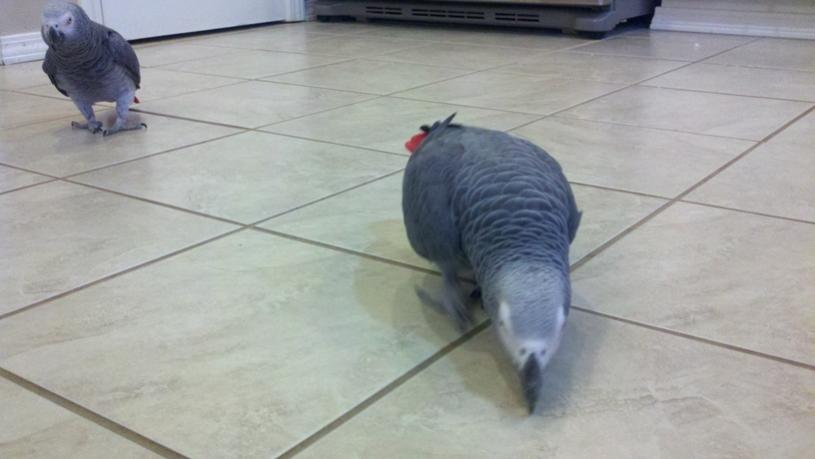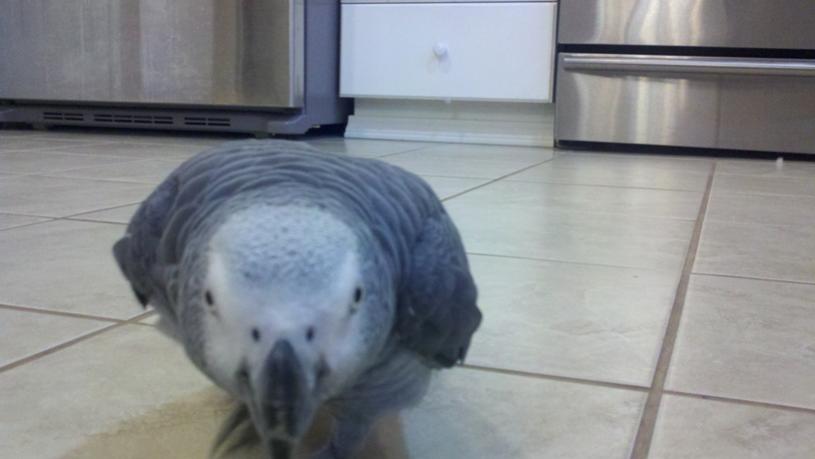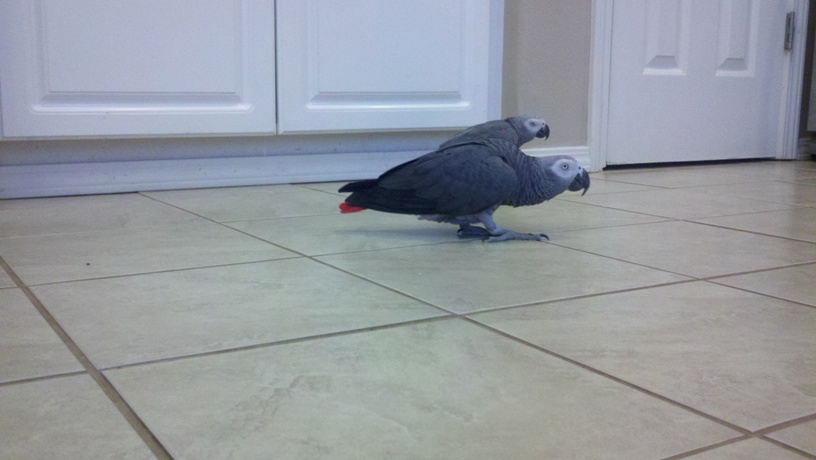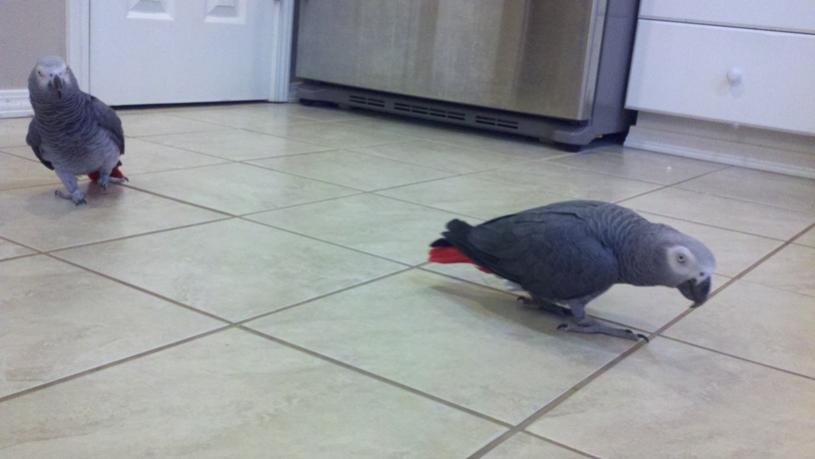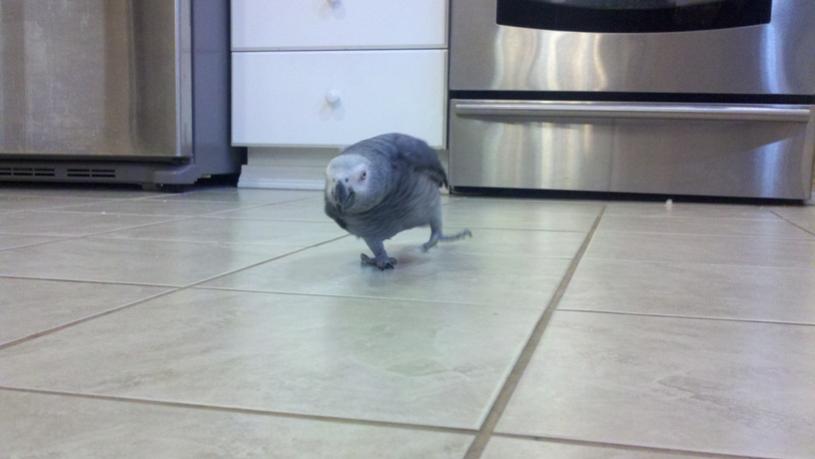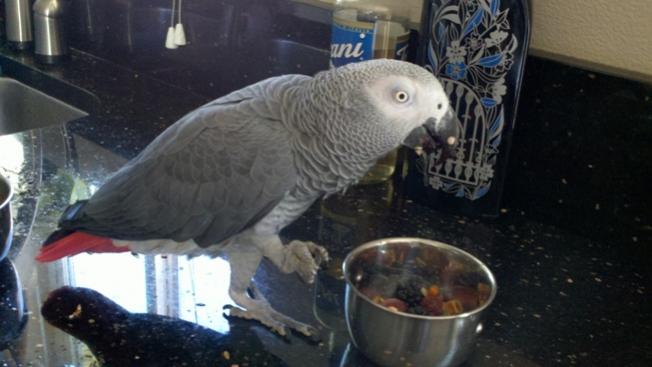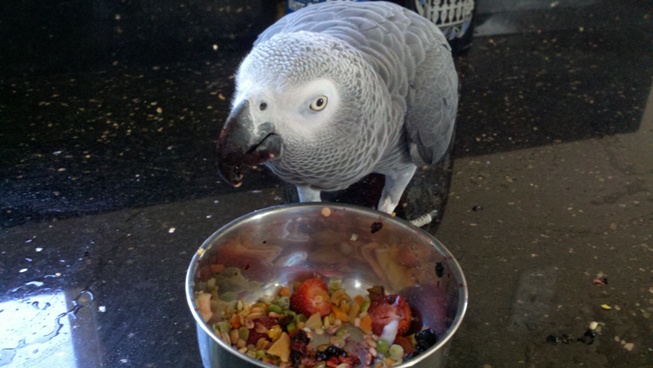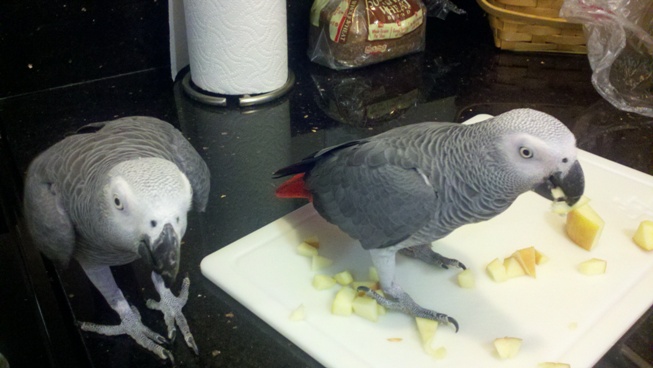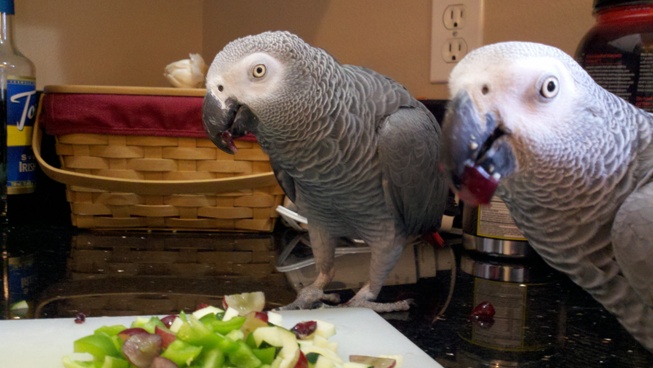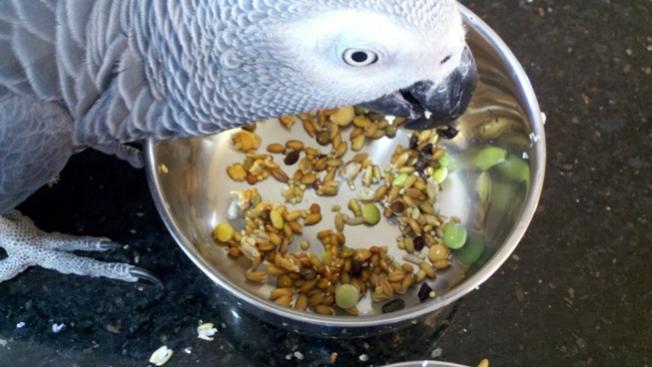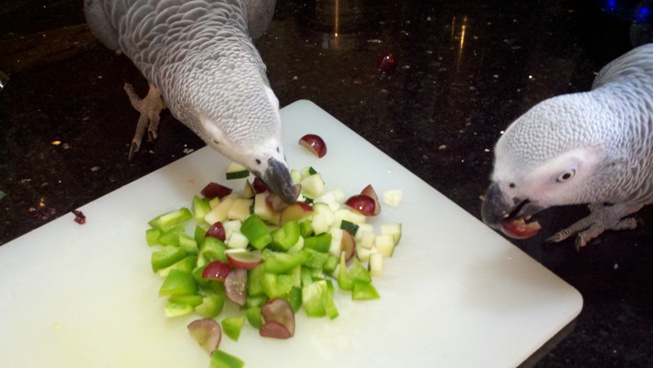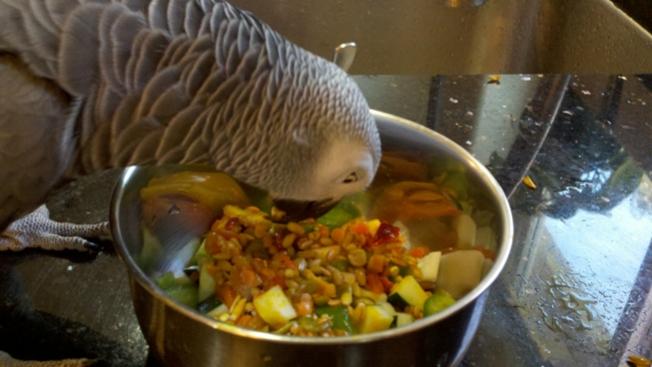NEW ADDRESS FOR MEMBERS GREYFORUMS.ORG
-
Posts
193 -
Joined
-
Last visited
Content Type
Profiles
Forums
Events
Gallery
Everything posted by zandische
-
Gryph and Seraph have discovered that being down on the ground makes them the kitchen's top new predator of all time, and the think their new favorite game is finding unsuspecting toes and ankles... Lured by the scent of human flesh, the sharks begin to circle... dunh-duhn, duhn-duhn...duhnduhnduhnduhn.... run away, run away! Almost got me... Aiiiiieee!!! It's almost here!!!!
-
Yay! A breakthrough! I had a class last night that ran from 5:45 until 11:45 pm. What a long day - at work all day, then off to class for the evening with only a small break in between to feed the birds. Well, whenever I go away and the birds have to go to bed before I get home, I always make a point to peek in and let Gryph know I'm back because I know how *I* feel on nights when I go to bed before my husband gets home...I don't really sleep until he actually gets home. So, I peek in and Gryph immediately runs out to the front of his cage, so I let him out. Then he shoots straight up onto my arm to the elbow and lays his head against my chest in classic "scratch me" pose. It was so wonderful! We spent about 1/2 hour scratching and cuddling, during which he was super relaxed and happy. I think the key ingredients to this interaction: assurance of safety: (I was home, flock was together, confidence was re-established), sleepy: not enough energy to get angry or upset, interested in low-key activities, sister: still in her cage asleep so no pressure or distraction from "the other woman." So, basically, all I need to do now is wake him up at midnight every night for some cuddle time?
-
I would not say so. Greys are notoriously shy talkers; they usually only talk when they feel they are "alone" or no one is paying attention to them. It may be that by turning to face the wall, your parrot feels like he's in his "secret space" where no one can see him or hear him, so while he appears to be talking to the wall, he's really just happy and comfortable enough to practice his words My bird will often go hide behind all his toys in the back of his cage and do birdie things, like talk to himself or preen etc. He says the funniest things in his "secret space" sometimes, and occasionally when one of us has been complaining about a bird doing this or that (such as chewing on the recliner...sigh) we'll hear a "Not Gryphon!" from the back of his cage. He is usually the one getting in trouble (his sister does a really good job of framing him) so I guess he likes to remind us when it's NOT his fault!
-
You know, AZ is looming large on our moving horizon, and I have thought that one of the first things I would do in sunny AZ is try to obtain a palm oil tree or trees. I know desert soil is pretty much a poor growing medium (unless you're a cactus) but it's not impossible to grow good things well in the desert...I can so totally envision an outdoor bird zone with red palm oil trees to snack on! Of course, I would probably -never- convince my birds to come back down...
-
LOL, Sarasota, you are funny! I am really bad about that too. My husband will usually say something sarcastic like..."Give him your hand, he likes to eat that..." You wrote: And I found this interesting, because unlike his sister (and most other birds I've read about) Gryph is almost NEVER cage territorial. He will attack me on site outside of the cage if I get too close, but inside he will give me kisses through the bars and let me scratch him, and I never fear a bite. Even with his recent behavior, he is super gentle inside the cage. He has always been like this. Food for thought... I don't know if we're doing *that* much better but at least I can pick him up with a treat now. Without a treat = no way! He IS, however, learning to give me a kiss whenever he comes out of his cage now. He gets a treat for doing this (sigh, still feels wrong to bribe my bird to be nice to me!) and I always "moderate" the kiss with a finger between us just in case he tries to latch on (at least he'll get the finger and not the face.) Hoping to establish trust this way. I'm also trying to do this with my hand but it's much much slower going. Oh, and he only does the kiss routine RIGHT when he comes out of his cage, if I give him 30 sec to realize that he's free, he is either off to find better games or ready to lunge! Yikes! Dan wrote: You know Dan, this gives me A LOT of hope. Gryph is this way, even right now. He really, really wants to be on my shoulder and if I leave the room, it doesn't matter how mad he seems at me, he will fly in to find me wherever I am. He cannot stand to lose sight of me. If I sleep in on the weekends my hubby will bring Gryph in and he will take up his "security detail" pose on the headboard until I get up, regardless of what the rest of the "flock" in the house is doing. And if I leave for an extended period of time (yay, traveling in a week and a half!) he goes bonkers when I return and becomes velcroed to me. Maybe I just need to chalk all this up to him being a horny, confused teenager who can't figure out how to talk right to a girl.... Or so my "human mind" tells me!
-
this is where i found my first info on red palm oil... http://www.holisticbirds.com/pages/palmoiltrials0803.htm And yes, the majority of info available is for humans, but so is the majority of info about broccoli, kale, sprouts, etc. Most birds don't eat these items in the wild either, but we all know they are good for the fids because of their nutrient content, which replicates a more natural diet. Point being, it is not difficult to draw a comparison between vitamin A deficiency,captivity, and lack of a natural diet., so while "hard" scientific evidence may be difficult to find on the role of specific foods in our birds' diet, understanding how these foods benefit humans is very helpful to understanding how they can benefit our birds. while it is very well known that red palm oil is a natural part of a grey's diet, high concentrations of vitamin A and E have been shown to be effective at treating skin problems and infections in humans; looking at a greys physiology, you have a powder down,ground foraging species that likely derives a species specific advantage from these vitamins. A vet could probably explain this all in far greater detail, but i don't think you have to be an "expert" to put the pieces together. Just use common sense! :-) I didn't know anything about food and it's benefits until parrots came into my life ; now my health has been severely compromised by disease and it has been my birds who've taught me how to help my body heal through food. People laugh when I tell them that but i'm living proof :-)
-
Dan! Mwahaha. This describes Gryph's behavior perfectly. WHENEVER he is mad he makes a hiss sound, which always preceeds a bite if I'm close enough. Thank you for all of the replies! You guys have such good info to keep me calm. It has been so tough these past few weeks not to just cry out of sheer frustration. I just want to know what I am doing wrong! I thought this at first too. And you may be right, there may be an element of rejection to it. When Gryph and I are alone together he becomes very lovey-dovey, to the point of doing his mating dance on my shoulder. But this involves an aggressive element and he has bitten me, so I stopped him from doing this and it may be taken as rejection. He would also do this same behavior on his perch, rolling upside down and biting my hand when I tried to pick him up, and my unpleasant reaction may just be a birdie slap in the face. I have been very careful to always greet him first, feed him first, give him kisses first etc etc,, but lately it has made no difference. One interesting thing is that if I approach him while he's doing his mating dance and try to remove his sister from his immediate area, he tries to bite her but not me, and will dip his head and let me scratch him very liberally on his head. I know it's bad to encourage mating behavior but I feel like this creates a positive interaction between us. For the most part though, I backed off and we have had very little interaction the last couple of weeks. No shoulder time, no scratches, no step ups...he gets to see me across the room but that is it. He spends a lot of time on his own while Seraph gets snuggles and I feel horrible about that, but it's sort of tough love. I approach him several times a night to offer a step up and talk to him but the minute he shows aggression I walk away. It hasn't made it "good" between us again, but he does seem more willing to interact with me now without biting. Sarasota - I've also been bribing him liberally as well, and there appears to be only one thing he is less resistant to than cheese - safflower seeds. During this away time I've tried to observe his behavior. It seems very much hormonal, and definitely influenced by his sister. If she is near his perch he goes right into the mating dance. Perhaps a feeling of rejection is fueling this behavior too, because while he becomes extremely aggressive at times, Seraph remains her sweet little self even when she seems to be tolerating his advances...including bestowing me (not her chosen person) with the occasional 15 min of "you may now adore me, worship me and scratch me" time. The last couple of nights she has even done a little dance for me, which is very she normally only reserves for my husband. It may just be that she's developing slower than G and isn't really sure what's going on yet. If I put Seraph to bed early, Gryph will usually calm down enough to sit on my arm, and some nights he wants scratches and some nights he just wants to sit there. I am really trying not to take it all personal! I am just hoping that in a couple of weeks he will settle back into routine. Seraph is certainly not interested in him as a mate (my husband is definitely her chosen one). It is just so frustrating at times and I don't understand why my bird seems to be going bonkers! I tell myself each day...this too shall pass...!
-
I only buy Jungle Products African Red Palm Oil. It is a bit more expensive at $12 for a 16 oz but it was readily available at my local Whole Foods for awhile and is really great quality. It really doesn't matter if you buy "african" or not as long as you are buying the palm fruit oil and not palm kernel oil. The fruit is what greys eat in the wild and this is the oil with the healthiest nutrients. Red Palm Oil has had some shortages in the world recently due to natural disaster, so it's slowly making its way back to the shelves. I bought two jars a year ago from iherb.com and they were the only ones stocking it besides a company purporting to be "all natural" who raised their price $30 on their remaining supply because of the shortage. I just opened my second jar and probably won't need to order again until at least Feb!
-
So those of you who saw my post over on the Bite Me thread know that I've gone through a pretty rough patch with my 3 year old CAG, Gryphon, over the last 8 months. I take a lot of responsibility for our slow learning curve, but I'm starting to feel at my wits end. Gryph is not a super snugly bird, but he does love to get his scratches every night and he is nearly inseparable from my shoulder. I do not try to force him to have contact with me but keeping him off my shoulder is a chore, (especially because he bites me now if I try to remove him.) For no apparent reason, about 8 months ago he started biting me - at first it seemed to be a form of rebelliousness, so when I would ask him to step up he'd bite, or when I'd try to stop him from getting into something he shouldn't be, he'd bite. Then he began biting my face from his shoulder perch with no warning or provocation. Then I thought it might be hormonal but sometimes it happened for no reason at all. I tried to restrict shoulder time but I wasn't as good about it as I should have been, and our "fights" escalated to the point where he almost got my eye. So I decided to change our interactions around and try to take back some measure of authority, and I began to offer him treat-based rewards for positive interactions. This resulted in a very good 3 months - better than good, actually. I didn't get bitten once, and my bird seemed to actually really like me! We were really progressing toward trust again. But the last two weeks have been miserable. Nothing works, not treats or soft words or lots of practiced step-ups. It's like some kind of lightswitch was thrown, and now he has been somewhat unaffectionately dubbed "Chomper." Monster would be another good name. I have a feeling this is a hormonal thing, because every time I let him out of his cage he makes a bee-line for his sister and does the mating dances with her (this has also been going on for the last year, and we keep trying to keep them separated and distract them during these times, but Gryph just seems driven to keep doing it.) If I take him in a separate room for alone time, he immediately becomes super interested in me and starts doing mating dances to me (which consists of him rolling over on his side and biting my neck or worse, my ear - um, ouch!) So now no more alone time. He has become super aggressive, to the point where I can't even handle him right now. The problem is, he only shows this behavior toward me - not toward my husband or his sister or anyone else who comes over. I didn't think greys got super-aggressive hormonal like Amazons, and I would definitely call his behavior over the top. He even shows the classic anger-display on his toys and cage whenever I come near to "display" to me and warn me of his "mightyness." Is this some kind of confused mating ritual? Or have I done something to royally tick him off and I just don't know it? I am ok giving him his space and all that, but is this eventually going to stop at some point when he gets older? And the other thing I'm worried about...that he has somehow decided he hates me and there is nothing I can do to change that. That seems really odd given the fact that for the first 2.5 years of his life he was really clingy to me, but I feel like if I have somehow become the source of his anger then being in another home might be a better life for the both of us, but the idea of giving up my bird makes me sick to my stomach. I just don't understand why I am the one to bear the brunt of his aggression and I can't see what I'm doing wrong. I wouldn't even care if he didn't want to be "my bird" but I would at least like to be able to pick him up if necessary! I also don't understand why sometimes he acts like a completely sweet and loving bird when I haven't changed anything about how we interact!!! What do you guys think? Can anyone offer any advice or experience on this, I'm seriously at the end of my rope!
-

Baby coming home Friday! Ahhh!! Help!
zandische replied to BeeFernandez22's topic in The GREY Lounge
OMG, that picture is so adorable! What a sweet baby -
Awww! Look at that smorgasboard! Your bird looks so happy - and should, that looks like a bird paradise. They always look so happy and content when they are in the middle of the cutting board
-
Haha, my countertop isn't clean...that's the curse/blessing of black granite...you can see ALL the dust and smudges but none of the dirt! LOL! I am constantly wiping that thing down and drying it...will never do black again, I swear! Did you get your photos?!
-
Thanks everyone You're all welcome to come over for bird breakfast whenever you want! Aw64 - my birds are 3 years old. When they are only 18 weeks they generally have a very limited view of what foods are really edible or "taste good" because they've only experienced what the breeder weaned them onto (hopefully veggies/fruits) and whatever you have begun feeding them. Most birds don't really develop a dislike of certain foods as much as they just don't realize what's in their bowl is food, and it can take time to teach them what foods are "good." Just be patient and keep offering an abundance of good foods. Also, a trick that has always worked for me is to let my birds see me eating the food first, then I offer it to them. I figure they consider me their poison tester so if I don't keel over from a blueberry, it must taste good and be good for them You can also try putting some "bird salad" on your dinner plate and letting your bird "join" you for dinner. He'll eat other things on your plate too, but if he learns that bird salad is part of dinner, it helps reinforce that it's food and he should eat it. Also, I always include my birds in dinner prep too (unless it's potentially hazardous to their health) so they know that when the cutting board comes out there is usually going to be some tasty scrap they can scavenge off it. Most of the time they are good and stay on the far side of the counter where I give them tidbits from time to time to keep them occupied...but there is nothing funnier than watching your grey bird skitter along the counter toward the pile of veggies on your cutting board while they think your head is buried in the refrigerator and you aren't looking
-
Hey Diana, a big welcome from another Oregonian! Good luck in your search for a grey. Everyone is here to help with whatever questions you have and there are a lot of great articles to read through on the forum. Have you decided if you will be adopting a rescue grey or finding a breeder? Greys are wonderful birds and will definitely change your life
-
And last but not least... You need to grow more blackberries and strawberries. These things are AWESOME. Yes, this beak is full of blackberry juice. And when I'm done, I'm going to come WIPE IT ON YOU TO SHARE MY APPRECIATION.
-
So here is a typical saturday morning bird breakfast. The birds love to eat on the counter, so usually I put their bowls next to the sink and give them stuff as I chop up their weekly bird salad (all fresh from the garden this week! Yay!) Sometimes they decide I need help... We start with sprouts...mmm, yummy! mmm...there's a whole pile of chopped zuchini and peppers topped with grapes...you mean those are for USSSS? What are you looking at? The grapes are the best part! We thought you needed a Quality Control team for these apples. They've been properly certified now. YOU'RE WELCOME. Hey, it must be second breakfast. There are red palm oil-soaked veggies in my bowl!
-

Grey versus human development - Anthropomorphism
zandische replied to danmcq's topic in The GREY Lounge
I tend to explain to people that my birds are like "having a 3 year old child for life" because a) that makes it easy for most people to understand what it's like to live with a parrot and b) they really are like that when they are throwing their food everywhere, putting everything in their mouth, eating everything, chewing on everything, getting into everything, and screaming with glee every 5 minutes! These are instinctive parrot behaviors but are easy to personify as human because it's not uncommon for a 3 year old to exhibit all of them. But in terms of cognitive learning ability, I don't believe you can equate the two species. In my experience and research, parrots learn differently than humans do, they think differently, and while they can interact linguistically, they are still processing information in a different way. I liken this to speaking to someone who is not a native English speaker, as was the case with my Russian friend, Lana. She once spent half an hour telling me about her family, how her son was growing up, how her parents felt one child was not enough, how his birthday party was next week, etc. When I finally asked her if she had ever considered having another baby, she looked at me like I was a moron and said, "That's what I've been telling you! I'm pregnant!" To which I responded, "Well why didn't you just say that!" But in Lana's mind, she had told me she was pregnant, just in a Russian way. Cognitive ability goes beyond just learning language and using it appropriately, and as many studies have demonstrated, extends to the birds being able to solve complex problems (ex: http://www.britannica.com/blogs/2009/07/the-cleverness-of-crows/ ). In its most basic sense, cognition is the capability to learn, remember, apply knowledge (to solve problems) and make decisions. I agree with Dan that ultimately, cognition begins with training of some sort - training is the tool that teaches the animal (bird, human or otherwise) what its boundaries of thought are, and it is only once those boundaries have been established that the animal is capable of "evolving thought." In other words, if you don't know what you don't know, how do you know what to think about it? So, from a parrot perspective, cognitive function occurs when the bird is able to learn (to step up results in a treat), the bird remembers what it has learned (steps up every time even when not offered a treat), the bird applies its knowledge (learns to associate the spoken words "step up" with the action) and the bird makes decisions (requests when to be picked up via word or verbalization.) Another example of this is the bird who learns to "go poop" over newspaper, associates the word with the action, and then makes the conscious decision to fly back to his cage (where the newspaper is located) and then returns to the owner when the deed is done. You can train these behaviors, but ultimately, the bird has to take a role in the decision making process at some point. Why do people obey laws? Because they understand there are consequences for unlawful actions, and they reason that breaking the law is not a good idea. (Some people, anyway!) The reason behind why the bird chooses to do certain things is their cognitive function, and while it may not be on the same level as a human, I don't think we have begun to understand what level it is on. From a personal standpoint, I've seen some pretty powerful evidence among my own birds of cognitive understanding. The first was with my first bird, who chose her own name. We named her "Athena" and one day she just decided she wanted to be called "T-bird" which was not something we ever called her or said to her. Somewhere along the lines she had heard the sounds of "T" and "bird" and decided they applied to her. (I don't have any idea whether she understood that "bird" meant her vs. us, but the name was certainly all her own thing.) I was calling her over to me by the name "Athena" and she was verbally arguing with me - every time I'd say "Athena" she would respond with "T-bird." When I finally realized she was correcting me, I said, "T-bird, come here," and she flew right to me. From there on after, she would not respond to the name "Athena" but responded immediately to the name "T-bird." She decided this when she was about 2. Thus, she became T-bird. T also learned other things. When she was bad she knew that she would go back to her home; on the way she would tell us "Tbird, good bird" or "Tbird, love you." She knew she had been bad, and she was doing her best to say she was sorry. It often worked on us Gryphon has learned to play catch. Initially, he learned that if he tossed a ball over the side of his toy basket one of us would try to catch it, and that this was a fun game because everyone would laugh. Put the toy back, repeat. Then he realized that he could throw the ball sideways, or behind him, or in a direction we weren't expecting, and that this would make it more challenging for us "to win." I didn't actually realize that he was throwing things in different directions on purpose until I saw him waiting to see what body position I'd take before he then adjusted his position to toss the ball in a way that made it impossible for me to catch, and then HE laughed at me. Gryph had realized the concept of "winning" - if we caught the ball it was a win for us, if we didn't, it was a win for him. And of course, the bird wanted to win I think it's extremely hard for scientists to prove cognitive ability in animals, so their "testing" scenarios have to be extremely complex and well-planned to ensure that there is no possibility of a conditioned response. But when you see your birds inventing new words, using words in context, and making decisions on their own on a daily basis, it's easy to realize they have real intelligence that goes beyond classification at a 3-6 year old human level. Besides, if my bird only has the intelligence of a 6 year old, why did it take me 6 months to realize that all he wanted from me was to ask him nicely when I wanted him to step up? He taught me something...so how's that for cognition? I prefer to think of my birds as "intelligent non-english speaking terrestrial aliens" than the equivalent of a 6 year old human -
Awww, I am so glad to hear "the spot" doesn't seem to be something major. I hope little Java is doing better! Please give her a big birdie hug for me!
-
Timbersmom - (and this is my experience only!) - I make 1/2 cup sprouts in my easy sprouter every 3-4 days, and that allows me to feed about a teaspoon per bird twice a day. I have two easy sprouters to make cleaning and rotation easier, and so my birds never go without. Although sprouts are living and growing all day long, I generally treat them like any other spoilable food. Even though they aren't spoiling per se, they are growing bacteria the longer they sit in the bowl. My birds love their sprouts when the tails are shortest and seem less interested the longer they grow, so I usually refrigerate the sprouts on day 2 to slow their growth and help them stay fresh. I also rinse very very well with cold water before every feeding...The only beans my birds seem to like are mung, adzuki and lentils. They seem to really like black oil sunnys, safflower, buckwheat, wheat berries, fenugreek, radish and alfalfa. I also give them brocolli seed when I can find it for less than an arm and a leg. Brocolli sprouts are very spicy! Moderators - maybe we should have a sprout sticky with member experience and links to info and resources?
-
Katana, I am so sorry to see this thread and realize what you have been going through while I was dealing with Gryph. I'm sorry I didn't see it sooner and you KNOW that my thoughts and prayers are with you. I hope that with treatment and all the love and care she gets from you she will make a full recovery. One thing I've learned is how much will these birds have to survive and how strong that really does make them. I've had to administer antibiotics/pain meds before for my birds, and I was really worried about using a syringe (even though I've handfed before). I actually found it pretty easy by using a teaspoon instead and mixing the antibiotic with orange juice. My birds go crazy over orange juice and they will drink it from any kind of device. I just fill the teaspoon with the mixture and encourage them to drink out of the spoon until it's gone. They do the work so there is no worry about aspiration. It's worked pretty well for me and they don't seem to realize what's going on Once when I was administering pain meds (my clumsy bird flew smack into the wall and bruised her keel and wing), the meds worked so quickly that my bird realized the "orange juice" was the source of her pain relief. She then wanted to be spoonfed orange juice all day long
-
Thank you And yes Judy, I hope to be around here more often! I've struggled with my own health issues this last year as well, but hopefully I am on the mend as well. Gryph is back to his old self with one exception...he has been getting sweeter with each day. Here he was last night, partaking of some scratches while he sat on my knee
-
Sprouting requires a quality seed, moisture and warmth. Unfortunately, bacteria thrive in moisture and warmth, so you have to minimize the opportunity for bacteria to grow by adding airflow and reducing any matter that might decompose during the sprouting process. Old/stale seed will not sprout well and may spoil rapidly due to the number of seeds that decay instead. A lot of bird seed mixes (like volkman etc) are actually treated with vitamins or include pellets or dried veggies/ fruits and this makes them unsuitable for sprouting as these things will decompose also. Sproutpeople.com is an excellent resource for sprouting supplies (I love the easy sprouters...far better than a jar in my opinion), high quality seed mixes, as well as free instruction. If you can't get their seeds into your country, look at what kinds of seeds they have in their bird mixes and see if you can buy them locally and mix them yourself. Also, you don't really need 27 different kinds of seed - if you can find quinoa, wheat berries, unshelled black oil sunflower seeds, raw almonds, fenugreek, whole lentils and dried peas, that makes a very nutritious mix. Sprouting any one of those seeds is nutritious. Again, always make sure to only buy untreated, unsalted, fresh seed. If your bird's seed mix is just straight seed and nothing else, you could try to sprout it and see what happens. If it is high quality, 95%of the seeds should sprout within 2-3 days. If not, then it should not be used. The key to healthy sprouts is to rinse often during the sprouting and always before feeding. Refrigerate sprouted seed so it wilk keep for 3-4 days. Healthy sprouts will smell like sweet, rich soil after a rain...in other words, good :-). If the sprouts smell old or moldy or stale, they go in the trash.. Some people like to rinse with GSE or apple cider vinegar to inhibit bacteria growth. Also, frozen seed keeps very well and will readily sprout, plus, refrigerating or freezing seed eliminates moth problems! Different seeds have different sprout times and this can affect their taste quite a bit. My birds love sprout people's bird mixes after 1 soak day and 1 sprout day, when the tails just show.. Wheat berries, quinoa and sunnys are tastiest at this stage. Peas, beans and nuts generally need at least 3-4 days of sprouting, until the tails are around 1/2 in long, before they are edible and won't cause digestive upset. Almonds won't sprout, but are considered "soak" seeds - you soak them overnight and feed in the morning. Radish, fenugreek and mustard seeds all have spicy tastes birds love. Experiment! :-) note: one word of caution about sprouting is that sprouts have lots of protein. They should not be fed often if your bird is also getting pellets. Too much protein can cause kidney problems/damage, which I learned the hard way with my birds. Because sprouts are so nutritious and natural, my birds rarely get pellets, so primarily get sprouts, mash and fresh foods. The only time they get seed is as a treat, and converting them to sprouts was easy - I just fed the soaked seeds instead of the regular dry seed and they didn't know the difference! Then I experimented to see which stages of sprouting and types of seeds they liked best.
-
also just a suggestion, learn how to sprout! Don't buy store bought sprouts...you need to grow them as they are best when the tails are just showing. Sprouts are highly nutritious and a phenomenal alternative to seed. They are also the closest to what birds eat naturally (aside from veggies/fruits). Including raw sprouts in your mash is a great way to add nutrients too. Some people think they are difficult, but if you can make mash you can make sprouts :-). Just a thought!
-
We got Seraph because she made googly eyes, wings and beak at my husband while I was playing with her brother, and then we decided it might be good for them to have a trusted buddy friend when they went to their new home. I have never seen a bird so in love from the first moment she laid eyes on her future person! THEN she came home, and by day 2 she was in love with me and my bird thought I was just his maid. Over the next year and a half my hubby and I worked hard to spend a lot of one on one time with our original birds, and while it wasn't always easy (especially with Gryph), eventually Seraph decided she preferred my husband after all. She and I still get along well and every now and then she wants me to "baby" her like I am momma-bird, but there is no doubt that my husband is her chosen person.. Gryph and I are finally falling in love after 3 years and a lot of adjustment, and our relationship is always going to be a work in progress. The hardest thing to learn for me was that a bird is not a dog - it doesn't love you "just because." It will love you deeply and madly and will be intensely loyal once its trust is given, but you have to earn that love. And much as it is with people, earning love takes time, respect, work and patience. Some birds (like people) give their hearts away more easily than others. :-). So just keep those things up!
-
I tried to get my birds interested in showers, but no luck. So I started bathing them in the kitchen sink once a week, after which they got lots of praise and almonds. Now, three years later, they still don't like getting wet, but they don't put up a fight anymore. They've figured out that not only do they feel better after a bath, but they gets yummy treats :-). It may be my climate (Pacific NW) but I've never found that they need aloe misting with a once a week bath, and they don't get too dusty in that time either. They do get a lot of palm oil in their diet though, so that might be helping their skin stay moisturized. Vitamin E is supposed to be very good for human skin, I believe?


